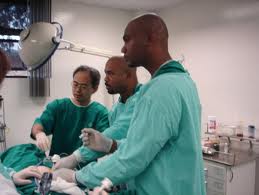By Donna Hussey-Whyte—-

Shakera Facey, 19, has a large tumour growing on her arm, and her story resulted in hundreds of responses offering support to her in her plight.
Dr Dawes, who is also president of the Jamaica Medical Doctors Association (JMDA) reached out to Facey after reading about her condition, which also detailed the family’s uncertainty following a diagnosis at the Kingston Public (KPH) which showed the teen’s condition to be cancer while examinations by private doctors showed inflammation. He said that the biopsy and follow-up examinations showed that Facey has a rare type of cancer of the bone called an osteosarcoma.
Osteosarcoma is a cancerous (malignant) bone tumour that usually develops in teenagers. Many patients first complain of pain that may be worse at night, and may have been occurring for some time. If the tumor is large, it can appear as a swelling. Sometimes a sudden fracture of bone is the first symptom because affected bone is not as strong as normal bones and may fracture with minor trauma, as in Facey’s case when she broke her fall in June with her left hand.
Facey, who resides in Redwood, Linstead with her father Vincent was working in St Ann when she went to dispose of garbage and fell. In an attempt to break her fall, she used her left arm to regain her balance and since then has been complaining of pain in her shoulder.
She had gone from private doctors to the Spanish Town Hospital, Kingston Public Hospital, and the University Hospital of the West Indies seeking medical assistance to relief the pain. But despite that, her condition worsened and the family refused to do chemotherapy when told by the hospital that it was cancer and the treatment was necessary. The family had complained of not knowing what to do then since they were receiving conflicting reports regarding Facey’s condition. She was also told that her chance of survival even with the chemotherapy was 50/50, and that she would also need to amputate her arm.
Last Tuesday, Facey was admitted at the Medical Associates Hospital in Kingston where medical personnel, headed by Dr Dawes removed fluid that had gathered around her lung causing her to experience shortness of breath.

“If she had stayed a day later, chances are she would not be here today, that is how bad it was,” Dr Dawes said on Tuesday. “I drew the fluid off her lungs and some was sent to test for cancer cells. The fluid could have caused her lungs to collapse if she didn’t come in when she did. After the procedure she was resting much better.”
Dr Michael Banbury, Chief Medical Officer at the Medical Associates said he was contacted by Dr Dawes who is also a surgeon at the hospital and told about Facey’s condition.
“He said that she had a tumour and as a result of the tumour she had developed fluids in her lungs and was in respiratory distress,” Dr Banbury explained. “He asked if we could admit the patient in order to remove the fluid so she could be more comfortable and we decided to do that from a compassionate perspective.”
Dr Banbury said that everything went well as they sought to drain the fluid from her chest and the team was happy to have helped her.
“We at medical associates care for patients who are not able to afford certain things, and so we show consideration in certain instances because we believe that we are here to provide good health care. Not everybody will be able to pay – whilst we are not a charitable organisation, from time to time we extend a hand of charity in the interest of the patients,” Dr Banbury said.
Facey has since been moved to the Hope Institute where she is being monitored and cared for by their medical team headed by Dr Dingle Spence, the institute’s senior medical officer and consultant in oncology and palliative medicine. This comes as doctors await the go-ahead from the teen’s family to begin chemotherapy which they say could stop the growth from getting larger.


You must log in to post a comment.